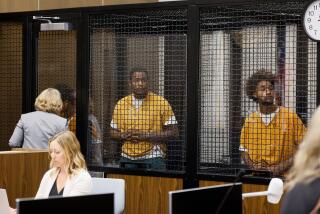Jeffrey MacDonald gets new hearing in ‘Fatal Vision’ murder case
- Share via
WILMINGTON, N.C. — This is the case that refuses to die.
Forty-two years ago, the wife and daughters of a handsome young Green Beret doctor, Jeffrey MacDonald, were stabbed and bludgeoned to death at the family home in military housing at Ft. Bragg, N.C.
MacDonald, now 68, is serving three life sentences for the crime, which spawned a bestselling book, “Fatal Vision,” a hit TV miniseries and decades of speculation over whether MacDonald is a sadistic killer or a victim of injustice.
In federal court Monday in Wilmington, N.C., the case will play out once again with all its lurid details — drug-crazed hippies purportedly at the murder scene, “pig” scrawled in blood on a headboard, and a mysterious woman in a floppy hat.
MacDonald, who has steadfastly insisted that hippie intruders committed the murders, has been granted a hearing to consider newly discovered DNA evidence, along with defense claims that a key witness was intimidated by a federal prosecutor.
U.S. District Court James C. Fox will decide whether to order another trial in the murders of MacDonald’s wife, Collette, and daughters Kimberley, 5, and Kristen, 2.
The case has wound through the courts for decades, reaching the U.S. Supreme Court. MacDonald was charged by military prosecutors of the Feb. 17, 1970, murders but was then cleared and honorably discharged after lengthy hearings.
But he was convicted of all three murders in federal court in 1979, only to be freed in 1980 when a federal appeals court dismissed all charges.
In 1982, the U.S. Supreme Court overturned that decision, and MacDonald was sent back to prison. He has since come up for parole but has been turned down after continuing to insist on his innocence.
MacDonald is expected to be in the courtroom Monday, along with several other central figures from the case. But many other participants and witnesses have died, making a probing of the facts more difficult than ever.
In granting the new hearing, the 4th U.S. Circuit Court of Appeals ruled in April 2011 that the courts should consider “evidence as a whole” in the case.
The new evidence includes DNA testing in 2006 that found several hairs in the hand of one of MacDonald’s daughters that do not match MacDonald or anyone else living in the house. The same testing also found MacDonald’s hair in his dead wife’s hand.
Fox will also hear evidence that Jimmy Britt, a former deputy U.S. marshal, told defense lawyers in a sworn statement in 2005 that he heard federal prosecutor Jim Blackburn threaten a key witness prior to her trial testimony. The witness was Helena Stoeckley, a heavy drug user and police informant who MacDonald’s supporters say was the woman in the floppy hat allegedly seen at or near the MacDonald home the night of the murders.
Britt said Stoeckley was prepared to testify that she was at the house that night but changed her mind after prosecutor Blackburn threatened to charge her with first-degree murder if she testified to that effect.
In several media interviews decades ago, Stoeckley said she was at the house and witnessed the killings, allegedly carried out by her boyfriend and another man. But once in court, she testified that she could not recall any details from that night because she had been taking drugs. Stoeckley, Britt and the boyfriend have since died.
Stoeckley’s mother, also named Helena, told MacDonald’s lawyers that her daughter intended to testify that her boyfriend, Greg Mitchell, and another man committed the murders but she lied at the trial because she was afraid of the prosecutor. The elder Stoeckley died in 2009.
The case attracted national attention, in part because it came just six months after the sensational California killings committed by Charles Manson’s followers. MacDonald claimed that one hippie among those who broke into his house chanted “acid is groovy, kill the pigs,” inviting comparisons to the Manson murders, in which “pig” was also scrawled in blood.
Prosecutors said MacDonald concocted the intruder story after reading an Esquire account of the Manson killings; a copy of the magazine was found in the MacDonald home.
MacDonald’s injuries, which included stab wounds and a collapsed lung, were self-inflicted by the physician defendant, prosecutors theorized.
MacDonald’s lawyers and defenders – including Kathryn MacDonald, who married MacDonald in 2002 at a federal prison in California – have insisted that MacDonald was a victim of bumbling by military investigators who contaminated or lost evidence, and by the misconduct of prosecutors.
The hearing is expected to last about two weeks.
More to Read
Sign up for Essential California
The most important California stories and recommendations in your inbox every morning.
You may occasionally receive promotional content from the Los Angeles Times.











